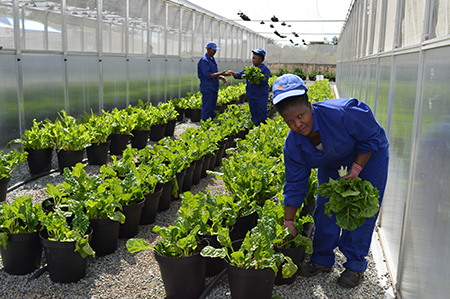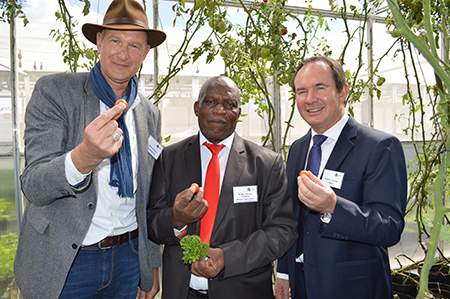A smart solar-powered partnership between the North-West University (NWU) and a German renewable energy company is empowering communities to grow food while generating energy.
Co-financed by the German government, this partnership between the Faculty of Engineering and SUNfarming, one of Germany’s 10 major photovoltaic project development companies, focuses on using technology-driven engineering solutions to take traditional, small-scale vegetable farming to new heights.
Initially, this partnership will benefit the local Ikageng community in Potchefstroom, but could later be used throughout Africa to transfer skills, generate energy and provide sustainable jobs and food.
Unique greenhouses
At the heart of this project is the Food & Energy Solar Training Centre at the NWU’s campus in Potchefstroom. It consists of unique agro-solar greenhouses, the first three of which have already been successfully tested and operated.
The beauty of the greenhouses is that they produce so much more - with less. “We are doubling the value of the surface area as not only agricultural produce is grown, but the solar panels are simultaneously also generating energy,” says Prof LJ Grobler, dean of the Faculty of Engineering.
Cauliflower, lettuce, spinach, cabbage, broccoli and onions are being grown in the greenhouses. The initial plants, fertiliser and compost were donated by the NWU and SUNfarming. Thereafter, the revenue generated from these products will afford the project beneficiaries to be sustainable for many production cycles to come.
Women play an important role
Several women from the Ikageng community have been identified and are being trained and educated about cultivation methods, insect control, nutritional values of the different crops, root systems and harvesting techniques.
“As soon as the vegetables are ready to be harvested, we will sell them to local supermarkets. We can use this income to compensate ourselves, buy new plants, fertiliser and compost to restart the process again,” says Motlalepula Magini, one of the beneficiaries. “It is a sustainable solution that not only creates jobs for us but also offers the opportunity to empower others with the wholesomeness from the earth. It enables us to be less dependent on others.”
She adds that they have a responsibility to transfer the knowledge they are gaining to their children and neighbouring residents. “I can already see the excitement about our project. We will soon be taking plants home where we will all start our own vegetable gardens. The plan is to expand this initiative further and to soon empower as many as 50 women with knowledge and skills.”

Beneficiaries and workers of the NWU’s SUNfarming project busy nurturing their vegetables.
This is the future - Minister
The Minister of Agriculture, Forestry and Fisheries, Mr Senzeni Zokwana, was full of praise for the project when he visited the project site at the NWU’s campus in Potchefstroom.
“What I saw today is the future of agriculture. I congratulate you on an unbelievable initiative and innovation,” he said. “It is important that these and other projects must seek cooperation agreements with the private sector in order to expand it further across the province and country.”
Echoing his sentiments, Prof Fika Janse van Rensburg, acting rector of the campus in Potchefstroom, said: “Many communities will be able to benefit from this initiative should it be rolled out on a bigger scale.”
Mr Peter Schrum, founder of SUNfarming, says this project offers sustainable production opportunities for communities like never before. “It can create between 50 and 65 employment opportunities per project, and offers an income opportunity that combines food production and energy generation. As it is combined, the risk factors are reduced significantly.”
The Food & Energy Project is the first of its kind in Africa and SUNfarming’s objective is to roll out it out to universities and schools across Africa. SUNfarming and the NWU then want to be the heart of expertise with regard to research, training and support for these universities.

Peter Schrum, founder of SUNfarming is seen here with the Minister of Agriculture, Forestry and Fisheries, Mr Senzeni Zokwana, and Prof LJ Grobler, dean of the Faculty of Engineering.
